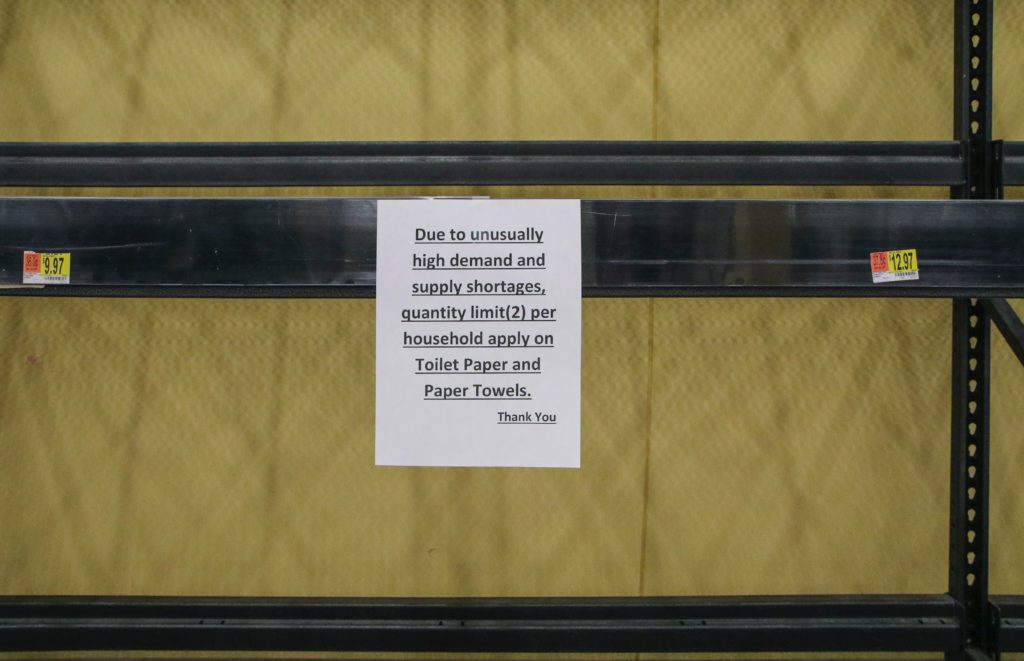There are a number of reasons for occasional cleaning supply shortages. Here’s how you can best position yourself to stay ahead of the curve.
By now, it’s probably a familiar lament for most cleaning companies. Cleaning supply shortages have been virtually non-stop since the onset of COVID-19 in the United States in March of 2020. Yes, there have been peaks and valleys, but every time another spike hits or another variant of the virus is discovered, the shortages seem to return almost immediately.
On the consumer market, shelves stocking paper towels and other paper cleaning supplies saw shortages of some twenty-one percent as of November 2020, as well as cleaning supply shortages of about fifteen percent in regards to cleaning products like disinfectants, cleaning wipes, and hand sanitizers. While those numbers are likely smaller in the commercial cleaning industry, even a shortage of five percent can hurt a business whose primary offering is janitorial services.
Despite many people getting vaccinated and many places in the country reopening, shortages still abound as variants continue to pop up and renew alarm bells people hoped had stopped ringing. As a result, businesses are losing money because they can’t perform the jobs as efficiently or maybe even at all if they’ve run out of even a single cleaning supply. Shortages could easily continue for any number of reasons, from shipping hold-ups to lower production to suppliers going out of business to storm systems slowing delivery.
So what’s to be done about these cleaning supply shortages on the commercial level? How can you ensure that you have the products you need to service your customers without interruption or reduced quality of service? Here are a few ideas to get you started.
Get a free discovery call with Janitorial Manager to find out how we can help with inventory management and so much more!
Find out what to do about cleaning supply shortages, and how to prevent them in the first place
Plan, plan, plan
At the start of the pandemic, planning was virtually impossible because no one knew what demand would look like except that it would probably be high. At the same time, while cleaners picked up new clients, they lost some previous clients to closed offices and other worksites. Cleaning professionals could barely (or in some cases, not at all) keep up with the demand. There was no way to get ahead of that except to order as many supplies as possible, which only contributed to the shortage.
We’re in a more stable place now. Even as the highs and lows of the virus come and go, we’ve learned how to adapt to the spikes in demand and what to do with the lulls. Using what we’ve learned over the last year, sit down and sort through a solid planning session to determine exactly how much of each supply you expect to need without going overboard. When products are available, order just a little more than what you need, but leave the rest for others to avoid further contributing to shortages. You’ll also be able to save yourself some money by not having to store products that maybe don’t get used if you end up ordering more than you need. Putting a solid plan in place is the best way to ensure that you’ve got just the right amount of products on order.
Use technology to manage inventory
Cleaning supply shortages can happen even when there isn’t some overarching factor. One reason is that if you’re taking inventory manually, it can be challenging to keep track of what’s in your storage closets versus what’s on each different job site. If you’re manually counting at headquarters and staff is manually counting on the job, you can get crossed data signals that can lead to a shortage.
Using technology like Janitorial Manager helps alleviate any challenges presented here because you can take inventory in real-time. Staff members can make a note right away when they run low on something, and the inventory you have on the shelves can be managed right in the app. This way, you’ll always know well in advance when you’re about to run out of something, which can even help you see if products are disappearing too quickly, which can be a signal that this is perhaps not being used responsibly.
Try other products
Sometimes when we find a product we like, we tend to stay pretty loyal to that product’s brand. However, there are usually at least a few options for things like disinfectant and all-purpose cleaner. They may not be your first choice, but if they can help to keep your business running during a period of cleaning supply shortages, it may be worth the temporary change. In fact, you might even be surprised and find a product you liked better than one you’ve been using for years.
If the only products available are more expensive, crunch the numbers. It’s likely that by investing in the more expensive products—especially if only temporarily—you’ll still come out ahead vs. losing a job altogether. Not ideal, but certainly a way to cope with temporary cleaning supply shortages.
Look for trades with colleagues
If you’re out of a cleaning supply, the odds are good that someone else has it. The odds are also good that you’ve possibly got something they need. That would be a good time to put competition aside and reach out to competitors and colleagues in the vein of the old barter system. Maybe you’ve got more paper towels than you need while someone else has too much disinfectant. Hash it out and agree to a fair trade to help keep both of your businesses going. Yes, it flies a little bit in the face of traditional business competition. Still, the reality is that neither your nor your competitors are probably going anywhere, especially if you’ve both been in business a while, so reach out a friendly hand and see if you can help to keep each other going.
As frustrating as it can be, the occasional supply shortage doesn’t need to be the end of your business. There are always ways to plan ahead, even for the worst case situation.
Enjoy a free consultation call with Janitorial Manager to find out more about the many ways we can help your business thrive!


